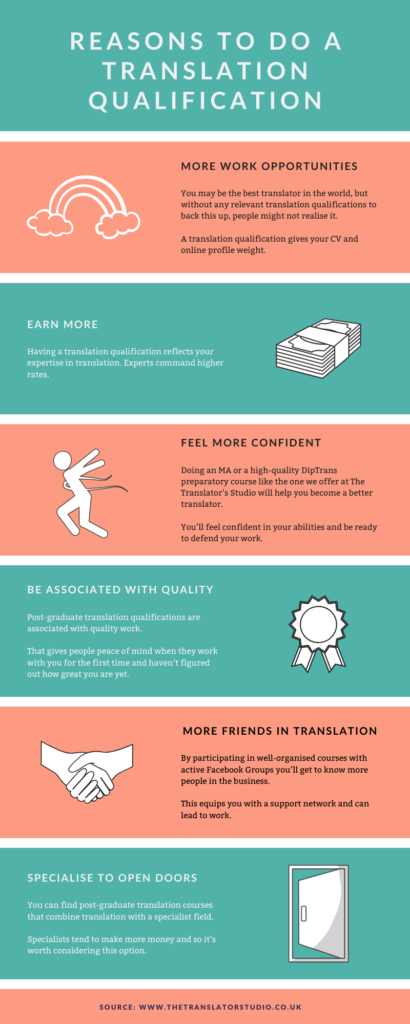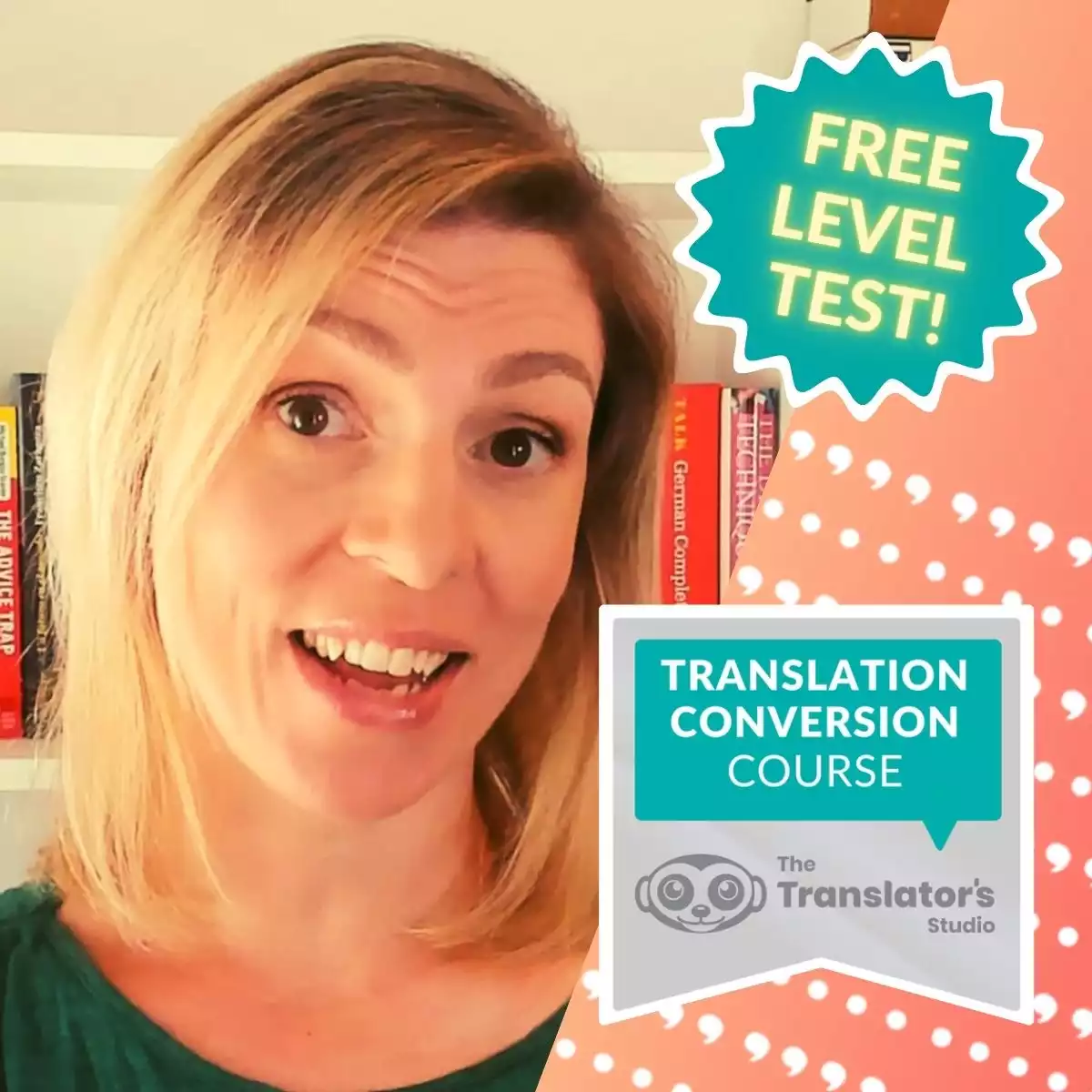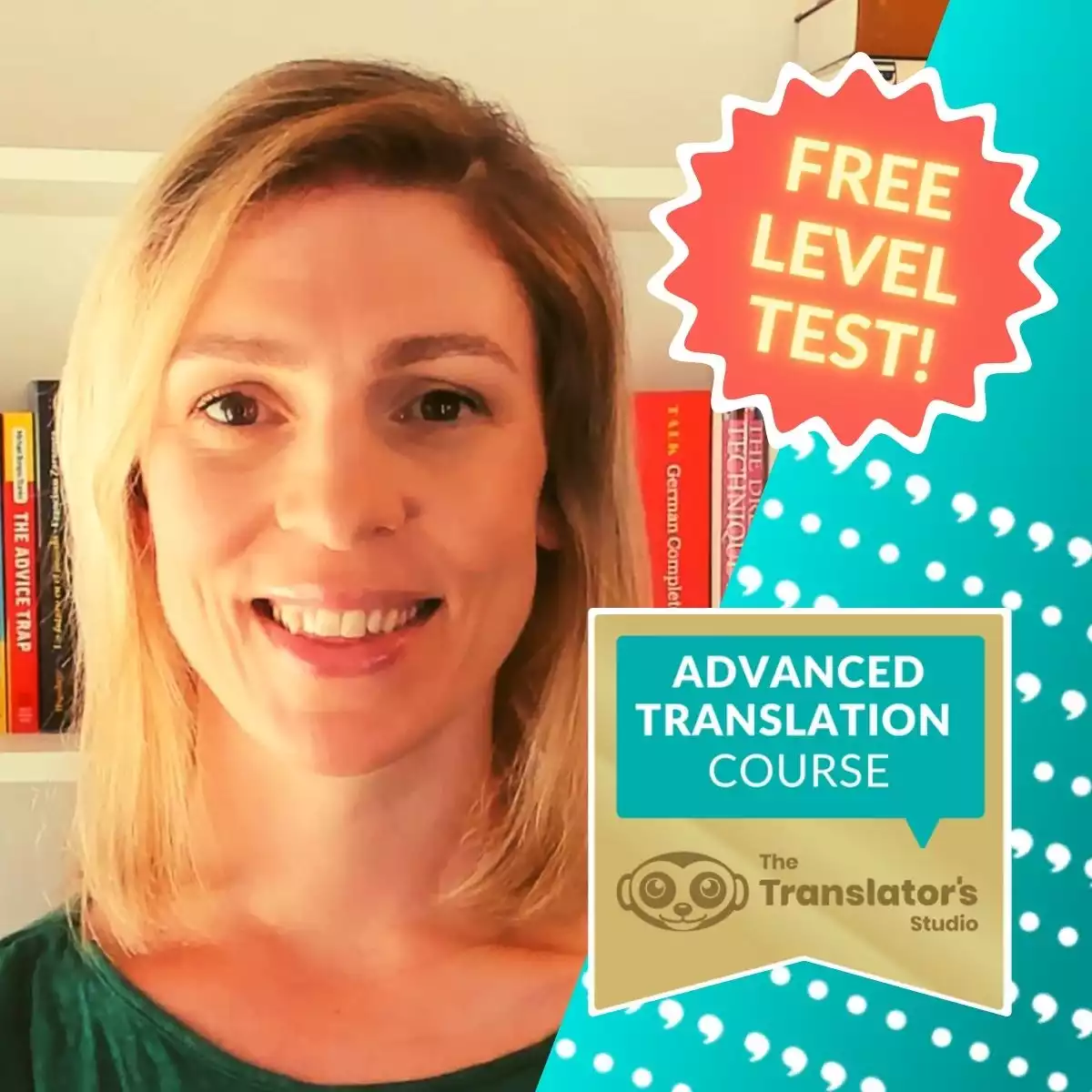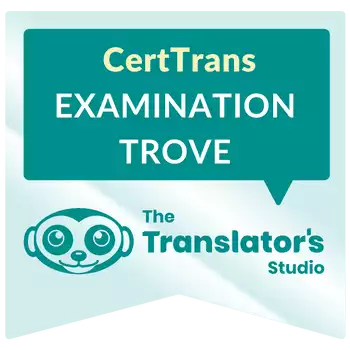Are you thinking about getting a professional translation qualification to improve your language services? Feeling unsure about the best choice for translator certification? Wander the Internet no further. You’ve found the consummate guide to translation degrees, particularly the MA in Translation Studies and the CIOL Diploma in Translation (DipTrans). Read on to have your bewilderment dispelled.

Why get a translation degree, MA in translation or the DipTrans?
Being a professional translator isn’t just about speaking a foreign language and being able to throw a sentence together. Producing a high-quality professional translation is a complex art and one that takes a great deal of time and effort to master.
Getting an undergraduate or post-graduate translation qualification goes some way to showing that you understand your art, that you’re a qualified member of the translation profession. It gives you letters after your name. A powerful CV. Authority. If you want to call yourself a professional translator, having a qualification to back that claim up will come in very handy when you start providing your language services. In short, these days, if you’re serious about becoming a professional translator, it’s a good idea to train and qualify.
What should you think about before you qualify?
When you think about having a translation degree, the DipTrans or an MA in Translation Studies, you think about the completed process, that certificate on the wall. So, you sign up for your course or exam or both, and off you go on your merry journey into the qualifications sunset. But wait a minute. The sun has set and risen again 365 times and you’re still in the process of qualifying. How many study hours did they say for that master’s program? Is this foreign language qualification I’m going for still relevant to my professional goals? What were those goals again? Am I here working on a Sunday? How much is this all costing me?
Yes translator, you’re right to be perplexed and hesitant. Signing up for an undergraduate degree or a major post-graduate translation qualification like the MA in Translation Studies or CIOL DipTrans is a major career decision. Not only that, but the process of obtaining and finally having these qualifications will affect your life in the short and long term.
I know this because I’ve been around the block a few times when it comes to getting language qualifications. I hold the DipTrans, an MA in Translation Studies and an MA in Legal Translation. To be fair, I’ve never done an undergraduate degree in translation or an interpretation program. But I’ve got plenty of friends who have. And I do have a bachelor’s degree in French and Hispanic Studies, though I was mostly partying while I got that one, so I don’t remember it very well. But don’t worry, I revised well enough in 2020, when I got my Spanish proficiency qualification, the DELE C2.
- Become a confident professional translator
- Learn fast with our extremely detailed feedback
- Prepare for the CertTrans exam
- Get your translation certificate
In this article, I’m going to share my experiences of getting MAs and the DipTrans, and talk a bit about what I know about similar qualifications. It’ll help you understand more about what you can expect to go through if you do them. I hope you’ll then be able to head off on the route towards the right translation qualification for you. And if that’s the DipTrans, then maybe you’ll stick around and check out our translation courses before you leave.
Why do a translation qualification?
There are lots of good reasons for doing translation-related qualifications. You can see them all on this pretty infographic we made for you. You’re welcome!

What’s the difference between a translation degree and the DipTrans?
We can split translation degrees into undergraduate degrees and MAs. It’s unusual to find undergraduate degrees in translation in English-speaking countries. It’s more likely that the budding translator will complete a language degree and then, if they’re academically inclined, move on to an MA in translation studies. This isn’t necessarily as true in countries like Spain, where it’s common for translators and interpreters to hold a bachelor’s degree in their profession.
MA stands for Master of Arts. That’s a post-graduate qualification issued by a university. You can attend in person or online. Over one or two years, you follow lectures and modules, you read and study and you’re assessed. When you complete the required work to the required standard, then you pass the course and you’re awarded your qualification.
- Become a more successful translator
- Learn fast with extremely detailed feedback
- Prepare to pass the CIOL DipTrans exam
- Get your advanced translation certificate
Contrast that to the CIOL Qualifications Level 7 Diploma in Translation (known as the DipTrans for short). This is also a post-graduate qualification. It’s OFQUAL regulated in the UK as a level 7 qualification and it’s and issued by the Chartered Institute of Linguists, London. Basically, it’s a three-part exam that takes seven hours to complete. You sign up and you do the exam over two days. If you do it well enough, you pass and are awarded your qualification. Exhaustive details about the DipTrans.
The DipTrans and a degree are therefore very different as regards content: a translation degree or MA in Translation Studies is a course; the DipTrans is an exam. But they do have certain challenges in common. It’s important to think about these challenges and how you’re going to overcome them before you sign up for anything. That way, you can plan for success.
What to think about before you sign up
The DipTrans and translation degrees have three challenges in common that you need to be ready to face.
1. They involve a financial investment.
2. They involve a time investment.
3. They involve a certain level of difficulty.
The thing about these three challenges is that they seem less important when you’re considering them abstractly than when you’re actually facing them over a prolonged period. When I think back over the time I dedicated to obtaining my qualifications, I remember battling, especially towards the end, with motivation, time management and pressure. I wasn’t prepared for how tough it would be. This was particularly true of the two master’s degree programs, both of which created a great deal of financial strain for me at the time.
Financial strain
I worked full-time while doing my three post-graduate translation qualifications because I had to support myself. Both of the translation master’s degrees were the source of major on-going financial strain. This was because I had to either replace work time with study time or dedicate all my free time to study. When you’re working and studying all the time, it’s very difficult to reconcile so much work with the fact that you have no spare cash. To complete the dissertation on my first MA, I had to leave my flat and move back in with my parents because I couldn’t make rent. During the second one, I had to ask to delay modules because I was struggling to make rent again, and didn’t want to have to move back in with my parents a second time.
Time commitment
If you’re able to dedicate yourself to full-time study, then you’ll be prepared for the time investment involved. This will, of course, be more time for an undergraduate degree, a bit less for an MA and less again for the DipTrans. Since I was working full time, the time investment meant I lost evenings and weekends. I had to cancel plans with family and friends to put study first. This can get a bit depressing and lead to burn-out. So, it’s important to plan ahead to make sure you stay on track and manage to get a break once in a while.
Difficulty
In terms of difficulty, the MA in Translation Studies is difficult because you have to learn about a broad range of aspects of translation theory and practice, read widely among academic papers, do research and produce your own papers, including a dissertation. If English is your second language then it’s even harder because you have to write essays in high-quality academic English. In theory, graduate programs are pitched at a slightly lower level than a master’s degree. But they cover a very wide range of subjects, which may include areas like simultaneous interpreting, language mediation skills, an additional source language and specialised translation.
The DipTrans is difficult because it’s a post-graduate exam. You have to give top performance for a gruelling seven hours with only paper dictionaries. It’s unrelenting, fraught with pitfalls and it makes you go blind. OK, that last part is a slight exaggeration, but I was definitely dizzy afterwards.
Note: since I wrote this article the CIOL has brought out the Level 6 CertTrans certificate in translation, which is designed for early-career translators. Find out about the difference between the CertTrans and the DipTrans.
All you need to understand how to pass the CIOL CertTrans exam.
- Self-study
- All language combinations
So, think before you act!
Owing to these three important considerations, it’s worth taking some time to think carefully about your goals to make sure the qualification you choose will help you attain them. By analysing your current abilities and future goals, it should start to become clear whether the best option for you is the DipTrans, probably combined with a DipTrans preparatory course like ours, or a translation degree.
Whether you’re an experienced translator or new to the profession, consider where you currently are in your career and where you want to go. Consider whether or not there’s market demand for the qualification you’re interested in. Be honest with yourself about the money and time you can realistically invest. A careful and honest analysis will help you make sure you choose a qualification that will fulfil your current needs and take you in the right direction.
The rest of this article contains lots of information that will help you identify the best option for you.
To complete the dissertation on my first MA, I had to leave my flat and move back in with my parents because I couldn’t make rent.
Cost of a translation degrees vs DipTrans
Regarding cost, a little bit of online searching will tell you that doing a university BA or MA is considerably more expensive than sitting the DipTrans exam. The costs of doing a university MA are in the thousands or tens of thousands, depending on the university and country in question. At time of writing, the cost of sitting the DipTrans online is about £800.
Now for the costs that aren’t so obvious.
Lost work time
When I first started qualifying, I didn’t really factor in the cost of doing qualifications as lost work time. That was a mistake. If, like me, you’re a freelance translator, you’ll know that we don’t get paid if we don’t work. Because of this, I view dedicating my working hours to another activity as a cost, as if I were spending the money I would have earned. So, when pricing up these qualifications, I recommend factoring in any time you’ll be unable to work as a cost.
Travelling costs
Studying online, as I did in my first MA in Translation Studies and in the DipTrans preparatory course that I did was considerably cheaper than physically attending classes. It was therefore a shock to my finances when I did my second MA in Legal Translation and had to fly from Seville to London several times.
Cost of failing
When you look at the prices for the DipTrans exam, you probably think that, while not cheap, it looks like an affordable one-off investment. That’s true. But do remember that if you fail a paper, or two, or all of them, then you’ll have to cover the cost of resitting.
DipTrans preparatory course
Many people opting to do the DipTrans will take a preparatory course. A top-end course like ours is a training investment. You should factor it in as part of the cost of attaining the level to pass the exam. If you’re new to translation, then we recommend you start with our conversion course (pre-DipTrans) before moving on to the advanced one. We appreciate that this is a bigger investment, though we also think it makes you much more likely to pass the exam first time around.
Long-term investment
Once you’ve established the cost of getting these qualifications, you need to consider whether the qualification that you’re going to do will enable you to make that money back, and more, in the long-term.
I just mentioned the significant travel costs of attending the course for my MA in Legal Translation. But, as a long-term investment, attending that course in person meant that I made friends with other students. My new contacts led to new work opportunities over time and so I eventually covered the higher costs that way. Some of the translator’s who’ve done our courses have had similar experiences because their contact with other professional translators through our Facebook group leads to recommendations.
In terms of specialisation, I find there’s a lot of market demand for legal specialists in my language combination. And I can charge more for it because it’s a specialist field. I therefore consider that MA to have been a wise long-term investment.
The DipTrans and the MA in Translation Studies also paid for themselves as a result of attracting more and better translation clients. And the combination of these three qualifications equips me to teach translation and to prepare other translators for the DipTrans, so I’m happy enough.
Thinking about doing the DipTrans exam or an MA in Translation Studies. Read this first! Share on XTime needed to do translation degrees vs DipTrans
In terms of time investment, an undergraduate degree will take three or four years, most MAs take one year of full-time study or two years studying part time. I had to postpone modules on two occasions, which lengthened the courses slightly for me. In both cases, the universities were flexible, supportive and didn’t make me pay extra. It’s probably a good idea to check the university’s policy on this (and on paying for re-sits) before you sign up.
With the CIOL DipTrans, the Chartered Institute of Linguists offers the exam online twice a year in January and July. You have to sign up a few months before.
When I came to actually do these qualifications, I learned a few other things about time.
Preparation time
The DipTrans also requires preparation time. Depending on your needs and preferences, this could involve studying over a number of months, doing past papers or taking a DipTrans preparatory course. It’s no secret that I think you should come and train with us on our Advanced Translation Course with DipTrans Preparation, on our pre-DipTrans course (CertTrans) and through our workshops. But marketing efforts aside, I genuinely think that investing the time in doing a quality preparatory course is a smart move. That way, you’ll become a more proficient translator and increase your chances of passing all three units of the exam on your first attempt.
Time pressure in the DipTrans exam
You’ll sit two of the DipTrans exam papers on the first day and the third one the following day. It involves seven hours of intense examination. That’s hard going (though not as much as when they used to make you sit all three in one day so count yourself lucky). You’ll also hit time pressure in each exam paper, particularly if you’re a developing translator. One reason why it’s a good idea to do a DipTrans preparatory course is to get professional assistance in refining your translation process to ensure you perform well within the time limit.
Time dedication to translation degrees and MAs
The time you can dedicate to a degree is endless. There’ll always be more to read, more to learn and some way to improve the essays or translations you’re submitting for assessment. The dissertation can go on forever and will become a monster if you don’t plan your time carefully. But, even with the best of planning, producing a top-quality dissertation takes a while. Some students fail to complete their degree for this reason. The university probably won’t give you your money back if you don’t complete. However, if you’re on an MA or MSc, they might award a post-graduate diploma if you do the full master’s degree but don’t complete the dissertation or final project.
On a more positive note, it’s possible to do an MA and work full-time. I did it, twice. The challenge is that if you’re working full-time, then the MA will consume all your free time. This will put strain on your sanity and on any close relationships you might have. It was tough for my partner and I would imagine that it’d be especially difficult if you have children. I was nothing but impressed by the parents on the legal MA course that I did at City University. Some of them were combining the MA with working full time and flying over from Spain, France, Germany or Poland four times a year. They were incredible.
My advice in this regard would be to involve those close to you in the decision process to sign up for these qualifications. Make sure they understand what you’re doing and why you’re doing it. If you can get their support right from the start, this should help you reduce stress.
Difficulty of an MA in translation vs DipTrans
Both the MA and DipTrans are postgraduate qualifications. That means to pass either of them, you’re expected to have a “postgraduate level of competence” (that’s a quote taken from the Chartered Institute of Linguists’ website). Regarding the MA, to get on the course, universities will probably ask for a good bachelor’s degree in a relevant subject, such as languages. You have to have a high level of English because at least some of the course will be given in English and you’ll have to write essays and, probably, the dissertation in English. If you don’t have a graduate degree, that doesn’t necessarily mean they won’t let you on the course. But you may have to prove your abilities through an entry test or interview.
With the DipTrans, anyone can sign up for it, but the CIOL does give a clear warning that the exam tests professional translation skills at a postgraduate level. Candidates are advised to have skills in their source language that are at least equivalent to a good honours degree, as well as relevant cultural knowledge. You’ll need first-language competence in the target language. That’s an absolute minimum.
Here’s my perspective on difficulty.
The DipTrans is “easier” if you have translation experience
I believe that if you’re an experienced professional translator, then you have a good chance of passing the DipTrans. I’ve also worked with professional writers and editors who have prepared with me and managed to pass all three papers first time.
If you don’t have any translation experience, then you have less chance of passing all the papers first time. This is because, beyond being a test of language ability and cultural understanding, it’s a test of professional translation, editing and proofreading skills.
Once again, this is where I underline the importance of a good preparation course. The pass rate on the DipTrans hovers around 25%. Our candidates averaged 63% in January 2021 and not all of them were working translators.
I want to tell you a little of my story here, to try to show you what I mean. But I’m tired of writing (and you probably need a break from reading). So, here’s a recording of my DipTrans story.
You can do a BA or MA in translation without experience
Unlike the test situation of the Diploma in Translation, a master’s degree is a progressive learning experience. You don’t need to be a professional translator when you start doing a translation degree because you’re going to develop and hone your skills during the course.
That’s not to say that a professional translator can’t also gain a lot from doing the MA. If you’re passionate about translating, discovering the discipline is a wonderful opportunity to give vent to that passion. Every student builds on their own skill set and fills their own knowledge gaps. You’ll do broader studies that may include elements like computer assisted translation (also included in our conversion course), other translation technology and specialised translation.
It’s harder to fail a translation degree. I chose the wording harder to fail, rather than easier to pass because I don’t want to give the impression that passing a degree s, in any way, easy. But assuming you do what needs to be done, degrees are harder to fail because they’re progressive. At least part of the qualification will be obtained through an assessment rather than an exam format. Also, when you do a course, you get continual feedback on where you’ve gone wrong and where you can improve. You have more time and more control over what you do.
A top-quality DipTrans preparatory course can provide you with a lot of these elements in a smaller package. Our Advanced Course includes translation theory. The foundational Conversion Course has a module on translation technology and tells you a lot about working as a professional translator. Both of the courses come with more detailed feedback than you’ll get anywhere (and that includes on a university MA). For that reason, you can approach them as a sort of mini-MA. Alternatively, you could use them to dip your toe in the water and see whether you think you’d enjoy going on to do a master’s degree.
What will you get out of each of these translation qualifications?
CIOL DipTrans
Pros
The CIOL Diploma in Translation is internationally recognised, certified proof of your translation abilities. It’s undisputable evidence that you can translate at a professional level. If you’re an experienced translator who doesn’t have any translation qualifications and who’s not interested in doing a degree then it’s probably a good option for you.
Assuming you have the level to pass, it’ll provide you with a relatively fast route to getting some translation-specific certification to put on your CV. The agencies that I’ve spoken to about this have told me that it’s a qualification that they respect and that they look for.
Cons
As I think I’ve now clearly shown, the DipTrans is a qualification obtained through examination, this means that what you won’t get out of it is knowledge. Knowledge about the translation process, your languages, the translation industry and so on. You won’t get any of that because it’s a test and not a course. However, if you combine it with a detailed preparation course, then you’ll grow as a translator that way.
The DipTrans is a very challenging exam and so you have to allow for the possibility that you’ll have to re-sit one or more papers. Translators find this frustrating because of the ongoing investments required in terms of both time and money. It’s also quite a kick in the teeth when you fail.
Translation and Interpreting Degree and MA in Translation Studies
Pros
I smile when I think about both of my MA courses because I got a lot out of them. While they were both challenging, I learned a lot, enjoyed the learning process and found them both very interesting.
The 100% online format of my first MA in Translation Studies from Portsmouth University, UK, was convenient as regards time management. It also worked out cheaper because I didn’t have to go anywhere. On the downside, it was a little lonely.
My second MA in Legal Translation from City University, UK, required me to go to London every so often, and the rest was done from home and online. It worked out much more expensive because of having to miss work and the cost of flying over from Spain. However, it was much more sociable. I really felt part of something on that course and made friends and work contacts.
I built up my knowledge and new skills in many different areas of translation and language. Both MAs were fairly practical and I could apply my new knowledge and skills immediately in my work. This was also great because it allowed me to consolidate what I’d learned and to continue building on it.
I did my first MA in parallel to starting my career as a translator. One of the modules required me to simulate a professional project and find my own text to translate. Because I was interested in literary translation, I contacted a local publishing company, explained the situation and offered to translate something for them for free. They responded the next day with three chapters of one of their novels for the project. They also said that if I’d translate the whole book then they’d publish it and pay me royalties. I decided to take a sabbatical from the course to give me time to translate the novel. While I didn’t make any real money, I got great experience, and a published novel to put on my CV.
Specialisation is especially relevant to MAs that focus on a specific element of translation. Since I went into translation from a language background, by the end of my first MA in Translation Studies, I had a very strong linguistic footing, but no clear specialisation. That was my main motivation for doing the second MA: I could see that there was money to be made through translation specialisation.
An undergraduate degree in translation will be even broader then an MA. A lot of them are combined with interpretation programs. You may be able study specialized translation or more than one language. It’s possible to find options like medical interpreting, legal interpreting, simultaneous interpreting, subtitling and literary translation. By developing both translation and interpretation skills, you’ll be well prepared to work in the language industry.
Finally, you have long-term pay-off. These types of course are investments and you’ll get long-term pay off as long as you know what you’re going to do once you finish. Now it’s all long over, I can see how the investments I made are paying off through more highly paid work, greater customer demand, more work in my preferred fields and opportunities to diversify.
Cons
Of course, it isn’t all wine and roses. Negatives that you may experience with translation degrees include stress, especially if you’re a mature student combining and MA with work and family commitments. Don’t underestimate the time involved. It’s a sacrifice in that respect and you need to make sure you’re motivated.
Additionally, if you come from a purely linguistic background, you may end up with more qualifications than you need on the language side of things. It’s worth remembering that translators with specialist knowledge of other fields are very much sought after. What’s more, their services tend to come with a higher price tag.
There’s also a higher risk of non-completion. Make sure you’re ready to go the long haul by ensuring you know what you’re signing up for and can realistically do it. It’s important to think about the financial side, but also your time, availability and motivation.
If in doubt, talk to the course provider. That’s what they’re there for. And remember, you could dip your toe in the water with our premium courses and workshops. They’re popular among translators from the US and the UK who want to do highly effective CPD with personalised feedback.
Questions to ask when considering a translation qualification
Here’s a few questions to help you decide which of these qualifications is best for you.
1. How much money and time do you have?
If the answer is not much, then a university bachelor’s degree or the MA in Translation Studies may not be feasible.
2. How competent are you at the languages involved?
If you’re uncertain about your linguistic competence, you’d do well to speak to the course provider first. We offer a free level test.
3. How much translation experience do you have?
This can be a make-or-break factor in the DipTrans. That’s why we added our foundation translation course to our offering. It helps linguists who aren’t working as translators to make sure they get enough practice before they sit the exam. It’s also why we offer resitter packs.
4. Are you interested in translation as an academic discipline?
If you’re not sure whether you’d enjoy studying translation theory and writing academic essays then the MA in Translation Studies might not be the right fit for you.
5. What are your career goals?
If you plan what you’re going to do when you’ve completed the qualification, then it’ll help you choose the right course.
6. Where are the gaps in your qualifications?
If you’ve already got language qualifications and a professional certificate like the DipTrans, then you have translation covered. In that case, it’s worth considering a postgraduate qualification in another field. This will open more potential doors for you within the translation universe and outside it. In contrast, specialists in non-linguistic disciplines may be lacking formal language training and foreign language qualifications. In that case, a course like ours combined with the DipTrans exam is one solution. An MA in translation studies is another option.
I was perplexed about whether to do the DipTrans exam or an MA in Translation Studies, but now I have a plan. Read this guide now! Share on XOther certification options for translators
If you’re still not certain whether the DipTrans or an MA in Translation Studies is right for you, then you may wish to look at other translator accreditation options. You could consider qualifications in other disciplines to develop a specialisation. There are other professional examinations out there, which are worth researching. If you’re in the USA, you may like to do the ATA certification exam (the American Translators Association is a professional association in the USA). Our courses are useful to help you prepare for any translation exam.
You could also look at diversifying by doing a course in a related discipline, like simultaneous interpretation, medical interpreting, legal interpreting, subtitling, localization management, learning an additional foreign language, copywriting, transcreation, copyediting or proofreading.
If time is a problem for you or you’re still not sure which road to go down, consider trying some shorter courses like our workshops or CPD packs. These can help you get a better idea of where you want to end up, before you start making larger investments.
And don’t forget that there’s a wealth of knowledge to be found for yourself in books and by following blogs.
As someone speaking from the other side of a bachelor’s degree, two translation-related MAs and the DipTrans, I know what I’m talking about when I say to take some time to think. Identify where you want your qualification to take you, and what you’ll do once it’s complete. This is a life-altering decision and a big investment, financially of course, but also of your time. Take a moment to map out your future, to ensure that you take the right path first time.
Get your free level test!
If you’re interested in training with us on one of our courses, drop us a line. Get started now by doing a free level test. Over a hundred translators have already taken our courses. They stay in touch with us and network through our private Facebook group. If you decide to come to train with us, you’ll also be invited to join the group and become part of our network.








0 Comments